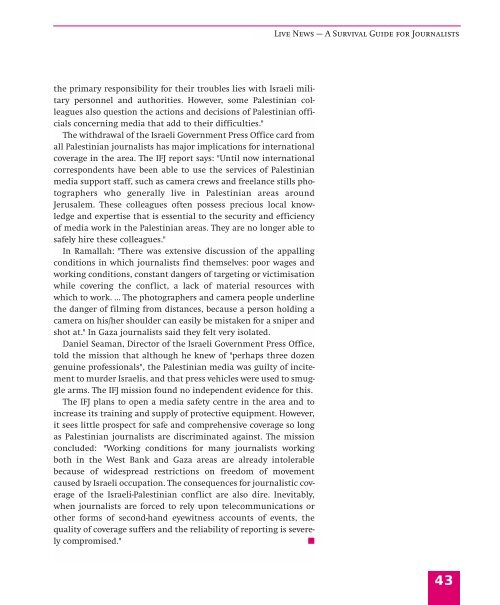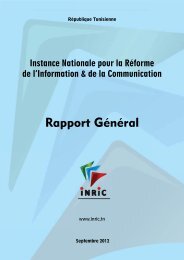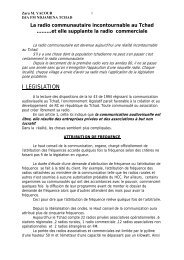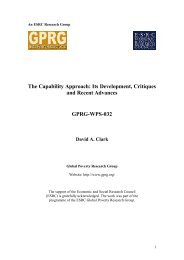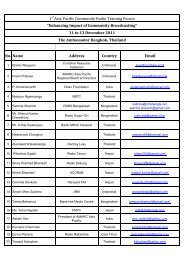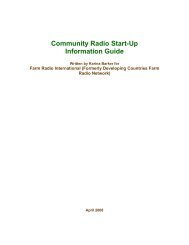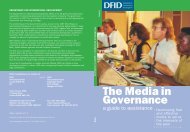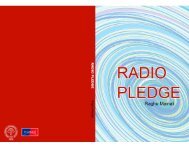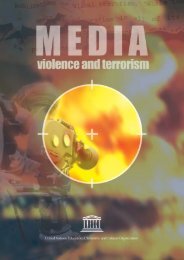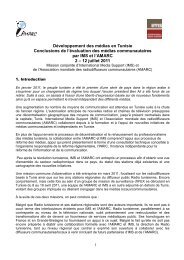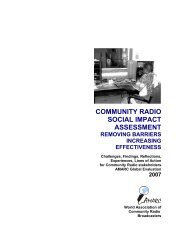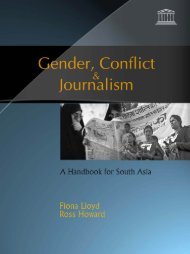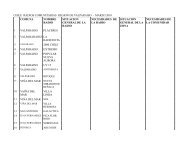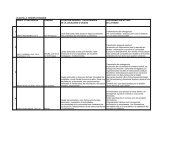Live News - A Survival Guide - International Federation of Journalists
Live News - A Survival Guide - International Federation of Journalists
Live News - A Survival Guide - International Federation of Journalists
- No tags were found...
Create successful ePaper yourself
Turn your PDF publications into a flip-book with our unique Google optimized e-Paper software.
<strong>Live</strong> <strong>News</strong> — A <strong>Survival</strong> <strong>Guide</strong> for <strong>Journalists</strong>the primary responsibility for their troubles lies with Israeli militarypersonnel and authorities. However, some Palestinian colleaguesalso question the actions and decisions <strong>of</strong> Palestinian <strong>of</strong>ficialsconcerning media that add to their difficulties."The withdrawal <strong>of</strong> the Israeli Government Press Office card fromall Palestinian journalists has major implications for internationalcoverage in the area. The IFJ report says: "Until now internationalcorrespondents have been able to use the services <strong>of</strong> Palestinianmedia support staff, such as camera crews and freelance stills photographerswho generally live in Palestinian areas aroundJerusalem. These colleagues <strong>of</strong>ten possess precious local knowledgeand expertise that is essential to the security and efficiency<strong>of</strong> media work in the Palestinian areas. They are no longer able tosafely hire these colleagues."In Ramallah: "There was extensive discussion <strong>of</strong> the appallingconditions in which journalists find themselves: poor wages andworking conditions, constant dangers <strong>of</strong> targeting or victimisationwhile covering the conflict, a lack <strong>of</strong> material resources withwhich to work. … The photographers and camera people underlinethe danger <strong>of</strong> filming from distances, because a person holding acamera on his/her shoulder can easily be mistaken for a sniper andshot at." In Gaza journalists said they felt very isolated.Daniel Seaman, Director <strong>of</strong> the Israeli Government Press Office,told the mission that although he knew <strong>of</strong> "perhaps three dozengenuine pr<strong>of</strong>essionals", the Palestinian media was guilty <strong>of</strong> incitementto murder Israelis, and that press vehicles were used to smugglearms. The IFJ mission found no independent evidence for this.The IFJ plans to open a media safety centre in the area and toincrease its training and supply <strong>of</strong> protective equipment. However,it sees little prospect for safe and comprehensive coverage so longas Palestinian journalists are discriminated against. The missionconcluded: "Working conditions for many journalists workingboth in the West Bank and Gaza areas are already intolerablebecause <strong>of</strong> widespread restrictions on freedom <strong>of</strong> movementcaused by Israeli occupation. The consequences for journalistic coverage<strong>of</strong> the Israeli-Palestinian conflict are also dire. Inevitably,when journalists are forced to rely upon telecommunications orother forms <strong>of</strong> second-hand eyewitness accounts <strong>of</strong> events, thequality <strong>of</strong> coverage suffers and the reliability <strong>of</strong> reporting is severelycompromised."■43


